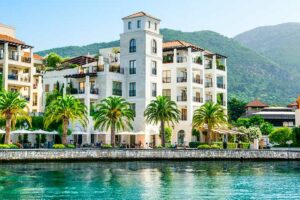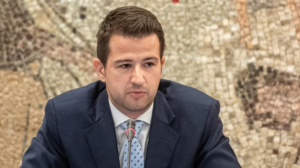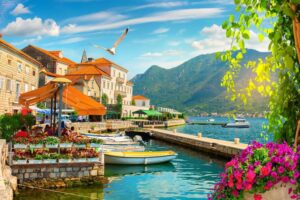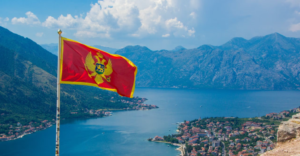
According to Serbian Economist, real estate prices in Montenegro continue to grow at record rates, while residents’ salaries remain significantly below the European average, and rent is becoming less affordable, local analysts note. The cost per square meter of housing in the country is already higher than in some EU countries. According to data from the Statistical Office of Montenegro (Monstat), the average price per square meter of an apartment in new buildings in the third quarter of 2025 was €2,228, in Podgorica – €2,153, in the coastal region – €2,458, and in the northern region – €1,578. Monstat specifies that the indicator is calculated based on primary housing sales transactions.
As reported by local media, real estate agent Haris Osmanagic previously assessed the Podgorica market as overheated and said that prices in the capital had “almost doubled” in a short period of time, with new buildings in some areas being offered at €2,800-3,500 per square meter.
The price increase has also affected the rental market: according to Osmanagic’s estimates, the average cost of a long-term rental in Podgorica is in the range of €550-700 per month, two-room apartments – €800-1,000, three-room apartments – €1,200-2,000.
In the European Union as a whole, housing prices in the third quarter of 2025 rose by 5.5% year-on-year, according to Eurostat data.

According to Serbian Economist, President of Montenegro Jakov Milatovic has sent to the President of Parliament Andrija Mandic a proposal to amend the Constitution to enshrine the general rule on non-working Sundays and days of public and other holidays for employees of the country.
According to the initiative, it is proposed to supplement Article 64 of the Constitution with the provision that employees in Montenegro do not work on Sundays and public holidays provided by law, while the possibility of establishing exceptions by law for certain activities is allowed, when it is necessary to protect the public interest.
In the justification, Milatović pointed out that the Constitutional Court on January 28, 2026 struck down as unconstitutional Article 35a of the Law on Internal Trade, which restricted the work of trade on Sundays and holidays, citing the violation of freedom of enterprise and the principle of equality.
Milatović also emphasized the importance of the trade sector for the country’s economy, noting that it employs almost 20% of workers and generates about 14% of GDP, according to data cited in the document, and workers’ rights should have a predictable legal basis.
https://t.me/relocationrs/2241

According to Serbian Economist, a number of Balkan media outlets reported that Turkey has become the largest foreign investor in Montenegro since 2020, with total investments estimated at over €417 million.
At the same time, official statistics show a more “volatile” picture over the years, with Serbia appearing as one of the key sources of capital. Thus, in an analytical review by the Parliamentary Budget Office of Montenegro, based on data on foreign direct investment (FDI) inflows for 2024, Serbia is named as the largest source with €118.2 million, followed by Russia with €109.7 million and Germany with €88.7 million. Turkey was in fourth place in 2024 with €39.5 million (the US with €37.2 million).
In 2025 (January-August), the ranking changed: Turkey took first place with €92.2 million, Serbia took second place with €91.8 million; followed by Russia (€45.3 million), Germany (€41.7 million), and the UAE (€34.7 million).
The key reason for these “swings” is the structure of investments. In 2024, the total gross inflow of SDI amounted to about €891.1 million, of which the largest part was accounted for by real estate transactions (purchase of properties) – €455.3 million, followed by intercompany debt (€292.1 million) and investments in companies and banks (€113.9 million). In other words, the ranking of investor countries largely depends on cycles in the real estate market and large one-off deals.
It is worth distinguishing between the “cumulative total since 2020” and the “leaders of a particular year.” Publications about Turkey’s leadership are based on the aggregation of several years and emphasize the acceleration of Turkey’s presence in the last 1-2 years. In particular, reports citing the Turkish-Montenegrin Chamber of Commerce estimate that investments from Turkey in 2024 amounted to approximately €100.9 million, and in 2025 (for 10 months) – approximately €110.8 million.
Serbia, in turn, remains a “structural” investor for Montenegro: in SDI statistics, it regularly ranks among the leaders, and in 2024 it took first place. In practical terms, this reflects the close connection between the two economies — from business and banking and service cooperation to active demand for real estate and tourism, which is why the Serbian share reacts significantly to the housing market situation and seasonality.
Overall, Montenegro’s SDI profile for 2020-2025 remains “real estate-tourism,” which means that the composition of leaders by country may change more rapidly than in economies dominated by long-term industrial projects.

According to Serbian Economist, associations of truckers from Serbia, Montenegro, Bosnia and Herzegovina, and North Macedonia have announced their intention to start protest actions on January 26, 2026, by blocking freight terminals at border crossings in the direction of Schengen countries. The planned actions were reported by regional media outlets, citing statements from the relevant associations.
The carriers cite the practical application and future tightening of controls in connection with the introduction of the Entry/Exit System (EES) as the reason for their actions. According to them, professional drivers from non-EU countries will effectively be subject to the 90-day rule within a 180-day period for short stays in the Schengen area, just like ordinary tourists. Carriers warn that with the “strict” application of the rules from spring 2026, some drivers may quickly exhaust their stay limit, which will create risks for supply chains and freight traffic between the EU and the Western Balkans region.
The European Commission has stated that it is monitoring the situation and is in contact with its Western Balkan partners, while pointing out that the rules for short stays in Schengen are “clear” and that practical decisions at the external borders are the responsibility of the member states.
EES is an automated EU IT system for registering the entry and exit of non-EU citizens on short-term trips, including recording document and biometric data, with the aim of improving the efficiency of external border controls and detecting overstays. The European Commission has announced that the system is being implemented in stages, with full deployment at all border crossing points planned for April 10, 2026, when electronic records are to finally replace stamps in passports.
If blockades are implemented at freight terminals, queues and delays are possible in a number of EU-Western Balkans directions, which may affect the timing of commercial deliveries in the region and throughout Europe.
Blockade, Bosnia, CARGO, Macedonia, MONTENEGRO, Schengen, SERBIA, Trucking company

According to the Serbian Economist, citizens of Ukraine ranked fifth among the key foreign tourism markets of Montenegro in terms of the share of overnight stays in 2025, providing about 4% of all overnight stays in the first seven months of the year, according to the review of the Serbian Economist with reference to data from Monstat and the National Tourism Organization (NTO).
According to the structure given in the material, the largest share of overnight stays in January-July 2025 was formed by guests from Serbia (22.8%), the Russian Federation (16.7%), followed by tourists from Bosnia and Herzegovina (about 8%) and Turkey (5%), followed by Ukraine (4%).
Serbian Economist also notes that 2025 recorded an increase in the number of trips with a decrease in the length of stay: in the first nine months of 2025, Montenegro was visited by 2.415 million tourists (about +5% compared to the same period in 2024), with more than 8.2 million overnight stays recorded by July (4.3% less year-on-year), and the average length of stay decreased to 5.6 days from 6 days in 2024.

According to Serbian Economist, Montenegro is tightening the requirements for obtaining and extending temporary residence permits (TRPs) for foreigners on two popular grounds: property ownership and business management. The law on amendments to the Law on Foreigners has been published in Službeni list Crne Gore (No. 3/2026).
In the parliamentary amendments that became part of the final text, the minimum ‘cost’ of a property for a residence permit on the basis of real estate ownership is set at no less than €150,000. The decision of the tax authority (the basis for property tax) is indicated as confirmation, and the rule does not apply to citizens of the EU, EEA and Switzerland.
It is noteworthy that the government’s initial proposal set a higher threshold of €200,000 and was linked to the tax authority’s assessment; it was this level that had previously sparked debate in the business community and among real estate market participants.
The authorities have reformatted their approach to extending residence permits for entrepreneurs and executive directors. The relevant parliamentary committee noted that the government had made amendments removing the requirement for Montenegrin citizens to be employed as a condition for extension and replaced it with the need to provide proof of paid tax obligations in the minimum amount of €5,000 per year.
The ‘real estate – residence permit’ link remains in place, but there is now a clear price filter that may shift demand to properties priced at €150,000 and above, especially in coastal and central municipalities. At the same time, the risk of imbalance for the north of the country, where prices are lower, was previously highlighted in parliamentary discussions as a sensitive issue for the regions.
For small businesses, the new model looks more predictable: instead of formal hiring, a measurable criterion of ‘taxes not less than €5,000’ is introduced, which potentially lowers barriers for companies without the need to expand their staff, but strengthens fiscal discipline.
Reference: the government explained the package of amendments as necessary for further alignment with EU migration regulations.